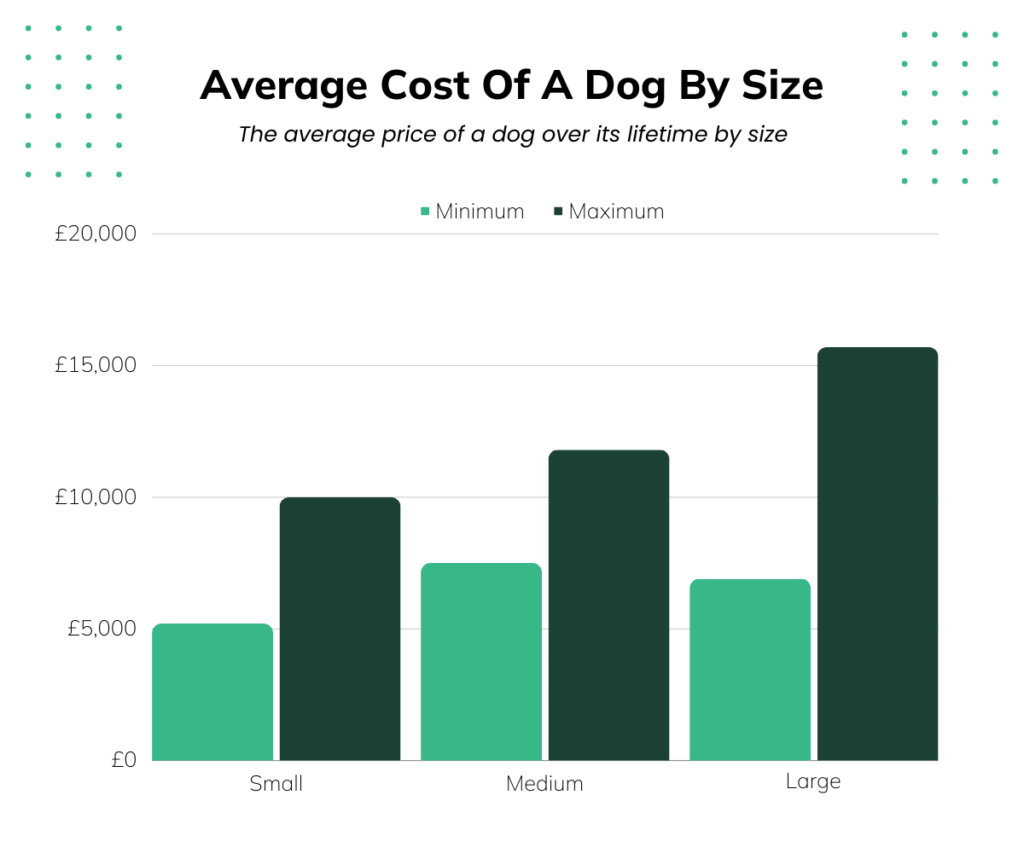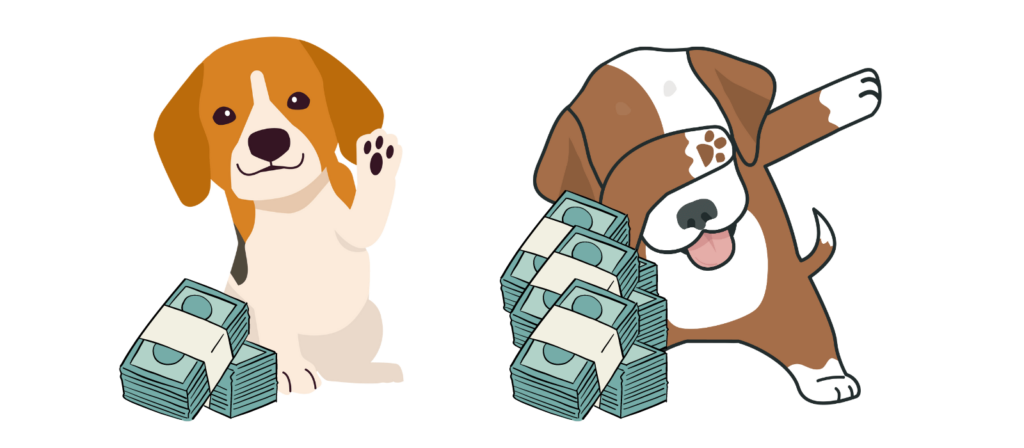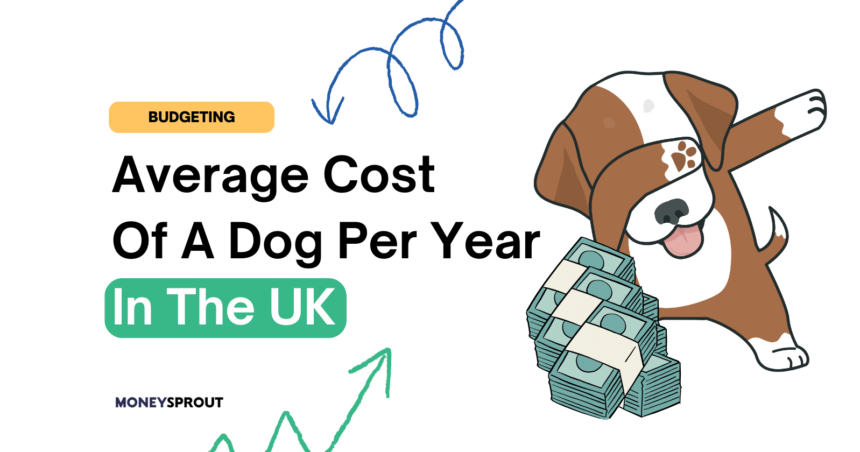As dog lovers, we understand the magical effect these furry friends have on our lives. Whether it’s the excited welcome at the door or the comforting presence on a rainy day, dogs are the ultimate equal-opportunity companions. They simply don’t care about your job title, your bank balance, or your latest fashion choices.
Their love is unconditional, and their ability to sense our moods makes them the paw-fect partners on our life’s journey.
But, before you take on the tail of a lifetime with a furry friend, it’s essential to understand the financial commitment that comes with the responsibility of dog ownership. In this article, let’s take a stroll through the average dog cost in the UK. We’ll cover the initial costs, ongoing expenses, and more that keep your canine companion in kibble and comfort.
Quick Overview
On average a dog costs £1,875 annually in the UK. This includes initial expenses, monthly costs, and additional considerations for training, boarding, and emergency vet consultations. Careful budgeting and awareness of breed-specific needs contribute to a financially responsible and rewarding dog ownership experience.
Key Facts & Figures
- Maintaining a dog in the UK typically incurs an annual expense of around £1,875. The most substantial portion of this expenditure, totaling £450 per year, is attributed to an estimated two weeks of boarding.
- In 2010, the average dog population stood at approximately 8.6 million. Since then, there has been a remarkable growth of over 40%, bringing the dog population in the UK to over 12 million.
- The top dog breeds in the UK are predominantly medium-sized, with Labrador Retrievers, Cocker Spaniels, and Border Collies ranking among the most popular choices.
Average Dog Cost UK
So, you’re thinking about adding a furry friend to your life – fantastic choice! Here’s what you need to know.
On average, the cost of caring for a dog in the UK comes in at around £5,200 over their lifetime. However, keep in mind that this figure can vary based on factors like breed, size, and individual needs. This makes the lifetime cost a ballpark maximum of £15,700.
Now, breaking it down by size:

| Dog Type | Minimum Lifetime Budget | Maximum Lifetime Budget |
|---|---|---|
| Small Dogs | £5,200 | £10,000 |
| Medium Dogs | £7,500 | £11,800 |
| Large Dogs | £6,900 | £15,700 |
- Small Dog Breeds (e.g., Dachshund, Shih Tzu, Chihuahua): Compact yet mighty, these little companions may have smaller care needs, but you should budget at least £5,200 to £10,000 over their lifetime.
- Medium Dog Breeds (e.g., Border Collie, Basset Hound, Whippet): Stepping up in size means stepping up in care costs. Plan on allocating at least £7,500 to £11,800 over the course of your medium-sized pal’s life.
- Large Dog Breeds (e.g., German Shepherd, Bullmastiff, Rottweiler): If you’re considering a larger canine companion, be ready for a more significant commitment. Large dog breeds could cost you a minimum of £6,900 to a maximum of £15,700 over their lifetime.
Here’s a practical tip: While purebred dogs have their allure, they might come with additional health considerations that could drive up costs. Adoption, often available at a low cost from shelters, is not just budget-friendly but can also be a deeply fulfilling experience.
Before you set your heart on a specific breed, consider checking out your local shelter. You might just find the perfect match waiting to become a part of your family without putting a strain on your wallet.
UK Dog Cost Factors to Consider
In the UK, more than half of households share their homes with cherished pets. No wonder you’d want to, too. Just keep in mind, however, that the Animal Welfare Act of 2006 underscores the legal responsibility placed on pet owners to ensure the well-being of their animals. This includes addressing the five fundamental welfare needs:
- Health: Protecting animals from pain, injury, suffering, and disease, and ensuring prompt treatment when necessary.
- Behaviour: Provide opportunities for natural behaviours, such as play, running, digging, jumping, and flying.
- Companionship: Offering suitable housing arrangements, considering whether they need to be housed with or apart from other animals based on their species.
- Diet: Ensure a suitable diet tailored to the pet’s life stage, with proper portions to prevent obesity or malnourishment, along with access to clean water.
- Environment: Furnish the right type of home with a comfortable resting place, hiding spot, and ample space for exercise and exploration.
Beyond the initial cost of acquiring a dog, understanding and addressing these needs is vital. Being unprepared for the financial responsibilities of dog ownership can result in unexpected costs as bills start accumulating.
Responsible ownership involves researching and comprehending the unique needs of each pet before making the commitment.
How Much Does It Cost When Buying A Dog
Bringing your first dog into your home involves upfront expenses that contribute to their well-being. These initial costs include essentials like a bed, lead, collar, tag (a legal requirement in the UK), food and water bowls, grooming tools, toys, car restraints, initial vaccinations, monthly wormers, and neutering.
The estimated upfront costs that we have found are:
- Small dog breeds: £404
- Medium dog breeds: £484
- Large dog breeds: £511
For those considering adoption, adoption fees generally hover around £180.
Beyond these necessities, a vet visit is necessary – potentially involving multiple visits yearly based on your dog’s age and health conditions. The right toys and treats also contribute to creating a positive bond between your dog and its new home.
Remember, these initial costs can vary based on your dog’s breed, size, and personal preferences. A bit of breed-specific research can shed light on the potential price ranges for each expense, allowing you to make informed decisions.
Moreover, consider your lifestyle and preferences as a pet owner. Some may opt for premium products, while others may choose more budget-friendly options without compromising on their pet’s well-being.
Explore various brands and product ranges tailored to your dog’s specific needs to optimize your budget.
What Expenses Are There With Dogs

Ensuring your dog’s well-being involves monthly budgeting for various needs, including yearly health checks, booster vaccinations, regular flea and worm treatments, insurance, food, toys, poo bags, and oral care.
The estimated minimum monthly costs are:
- Small dog: £57
- Medium dog: £70
- Large dog: £97
These figures may increase if your dog has specific dietary needs or other ongoing care costs. The estimates also don’t cover vet fees for illnesses, or services like boarding kennels, training classes, grooming, or daycare.
Understand the individual needs of different dog breeds in order to budget effectively, taking into account variations in food requirements, grooming needs, and potential health issues.
Training and Behaviour Classes
An untrained dog is more likely to exhibit aggression, anxiety, excessive barking, destructive chewing, and house-soiling behaviours. Ensuring your dog is well-behaved aids in living a harmonious life together.
Various training options are available, each with its associated costs:
- Puppy group training (obedience): £25 – £40
- Adult dog group training (obedience): £25 – £40
- One-on-one training: £65 – £90
- Aggressive behavior training: £40 – £90
- 4-week residential training (advanced obedience): £1200 – £4000
Local dog training costs can vary due to factors like location, trainer experience, training method, class size, dog breed, and duration.
Moreover, investing time in understanding your dog’s individual temperament and preferences can influence the effectiveness of training. Some dogs may respond better to certain methods, while others may benefit from more personalized, one-on-one sessions.
Flexibility in training approaches can contribute to a smoother training experience for both the owner and the dog.
Pet Sitting and Boarding
Depending on your lifestyle, you may opt for various pet care options, including professional pet sitters, boarding kennels, catteries, ‘pet hotels,’ or home-from-home dog boarding.
Prices vary based on the service you choose:
- Dog kennel: £17 – £29
- Dog hotel: £29 – £48
- In-home dog boarding: £20 – £27
- Premium suite: £50+
Practical tip: Consider alternative care options, such as relying on friends or family, for a cost-effective and emotionally reassuring solution for both the owner and the dog. While professional pet care services offer convenience, personal relationships can offer a more familiar and comfortable environment for your furry friend during your absence.
Contingency Fund
Budgeting for unexpected costs and emergencies is a responsible characteristic of pet ownership.
Emergency vet consultations in the UK average around £200, with variations based on location. We discovered that, on average, an emergency vet appointment was the priciest in Scotland, totalling £245.72, while London ranked as the lowest at £172.25.
It literally pays to be financially prepared for potential emergencies, and having the right pet insurance can provide peace of mind, covering out-of-hours emergencies and relieving financial burdens.
While pet insurance provides a safety net, a dedicated contingency fund can also offer additional reassurance, ensuring immediate expenses can be covered without delay.
Wrapping Up
Dog ownership comes with both joys and responsibilities, so understanding the average costs is a must. From initial expenses to ongoing monthly commitments, each pound spent is an investment in the health and happiness of your furry companion.
Tracking costs may seem tricky, but we’re here to make it easier for you. Consider checking out our Monthly Budgeting spreadsheet, which is designed to streamline the process and help you stay on top of your financial needs.
With careful planning and a well-managed budget, you can ensure that your dog receives the love, care, and attention it deserves, making dog ownership both rewarding and financially manageable. Good luck with your dog parenting!
Read More From Money Sprout:




